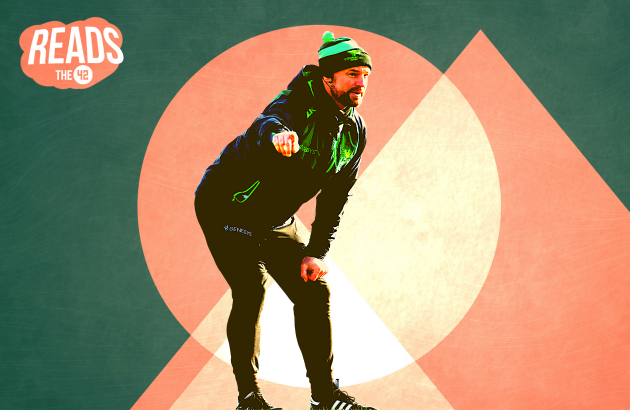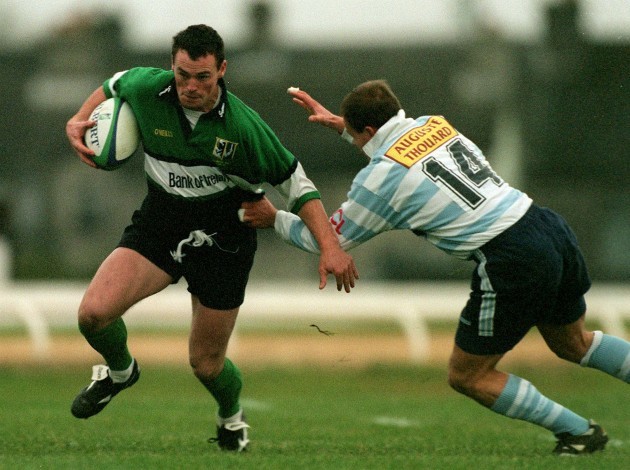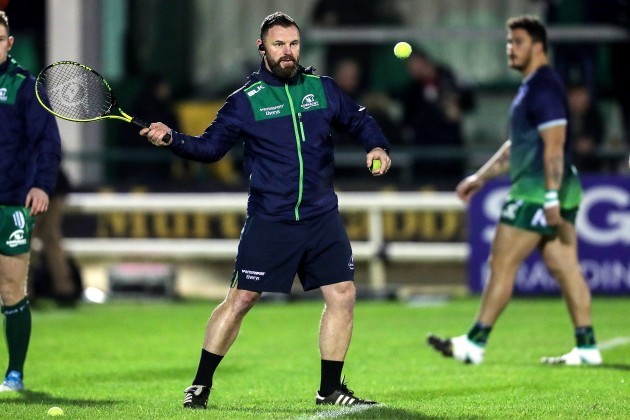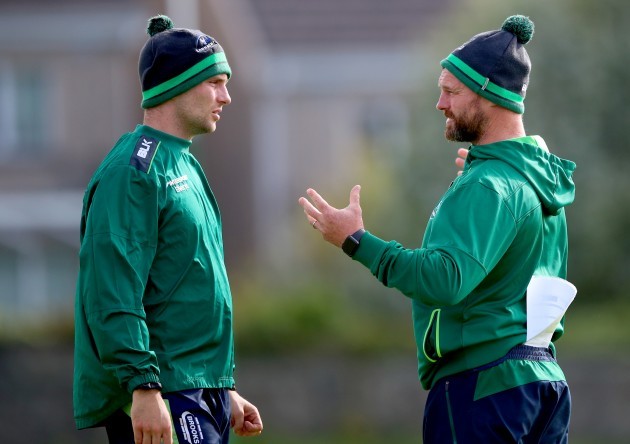IT’S THE EARLY 2000s and Connacht Rugby is in a bad place. On the pitch, the team are actually fairing alright. They reach the quarter-finals of the inaugural Celtic League in 2002, and repeat the trick in 2003, although the gap between themselves and the next tier of teams is clear.
On the other side of the country, heavy talks are taking place in the IRFU’s offices. Irish rugby’s governing body comes to the conclusion that Connacht simply aren’t worth the hassle or the money, and decide they will disband the club in a bid to ease the Union’s growing financial burden.
Two thousand supporters march on the IRFU’s offices and Connacht Rugby is saved.
The province struggle on without the resources necessary to compete at the top level, and a growing acknowledgment that something needs to change. One year later Nigel Carolan is hired as Connacht’s first Academy manager. He comes to job with big ideas.
Carolan won’t leave Connacht until 2021, when he will decide, on his own terms, it’s time for a fresh challenge. Few people have played such an important role in the club’s growth.
“Any session with Nige, you were always looking forward to it,” says Andrew Browne, former Connacht player and graduate of Carolan’s Academy.
- For more great storytelling and analysis from our award-winning journalists, join the club at The42 Membership today. Click here to find out more >
“It was always going to be fun, there was always going to be ball involved. That was kind of his mantra for a lot of the lads coming through the Academy, to increase the skill level and get comfortable with ball in hand.
“He nearly had this bag of tricks with rugby balls, tennis balls, golf balls – we’ve seen him so much with his tennis racquets and his tennis balls at the start of games – working on hand-eye coordination with players. So it was all that fun stuff, but it was actually really beneficial to your game as well. It was enjoyable, but you also knew you were getting better at the same time.”
*****
“Nigel was a big believer of heads-up rugby and playing to where the space is” – Robbie Henshaw, 2021
Carolan quickly goes about moulding the Connacht Academy into his own shape, with a major emphasis on developing skills and encouraging players to be brave on the ball. The former winger promotes an attacking style of rugby that excites and engages Connacht’s young hopefuls. Those sessions leave a lasting impression on some of the Academy’s star graduates.
During this year’s Six Nations, Ireland’s in-form centre and former Connacht man Robbie Henshaw is asked about the squad’s desire to play ‘heads-up’ rugby, which is the buzzword of the week. Not for the first time in his glittering career, Henshaw gave a nod to Carolan.
Those who played under Carolan at the time remember an innovative, thoughtful coach who also put a major emphasis on developing his players’ rugby intelligence by making them think about the game.
“Skills were huge,” says Eoin Griffin, another product of Carolan’s Connacht Academy who went on to represent the province over 100 times.
“Especially with the forwards. I remember we used to do weight sessions, and then you’d have to go straight out and do skills, which was basically just half an hour of practicing your offloads, out-the-back flicks, falling on your knees, from your knees on to the ground, simulating as if you have been tackled and doing it over your shoulder or whatever it was. You do a whole summer of that and it really stands to you.
He really encouraged that stuff, like expressing yourself and having ambition, but also thinking your way around the field. Like, why would you just kick the ball out from a scrum in your 22? Why would you just kick it straight out when they have their whole back three in the backfield? What is the real benefit there? So just thinking your way around those sort of things, it wasn’t just running it for the sake of it, it was understanding why you would do certain things in certain areas.”
“I think he sees that giving players the exact message and going ‘This is what we are doing’… you are not really helping players learn,” adds Browne.
“Nige is more about giving them a foundation, ‘Go away and look at the opposition yourselves and come back to me and tell me what you see.’ It’s empowering them to go and do some work, because that’s the way they will learn.
“I think that’s where he has really excelled with the backs, maybe increasing their rugby IQ a little bit. He just knows how players learn.”
*****
“You really want to play for the guy” – Paul Boyle, 2021
Carolan’s training methods do much more than create attacking-minded, thoughtful rugby players. The idea of sharing out responsibility and talking though ideas as a group helps Carolan form a close personal bond with his those under his tutelage.
In 2008 he branches out, joining the Ireland U20s as an assistant coach, and later takes the reins with the Connacht Eagles. In 2014 he is named head coach of the Ireland U20s, juggling the role with his ongoing work with the Connacht Academy.
Two years later he leads a team including names-to-watch like Jacob Stockdale, Hugo Keenan, James Ryan, Shane Daly and Andrew Porter to Ireland’s first – and so far only – appearance in the final of the U20 World Championships, losing to England but solidifying his reputation as a coach with a clear knack for spotting and developing young talent.
Speaking shortly after Carolan announced his decision to leave Connacht earlier this year, back row forward Paul Boyle told The42 why the departing coach has been so successful working with young players. Boyle first worked under Carolan with the Ireland U20s, and subsequently moved from Leinster to Connacht.
“Nige played a big role in getting me here, and I’m forever grateful to him for that,” Boyle explained.
“He’s so easy to get on with. He mixes the coaching with a bit of craic as well, and you end up wanting to play for him. For me, that’s a huge thing with a coach. You have to want to play for them. He can come down hard at times, which you obviously need as a coach, but the main thing is you really want to play for the guy.”
That sentiment is echoed by Griffin.
“He’s very easy to talk to,” he says. “He has a good mannerism about him, you can chat to him about most things.
“I think he likes to enjoy what he does and likes to have everyone else enjoy it. It would very much be a two-way street in terms of communication, and that was kind of always the way.
“He wasn’t really ever telling you what to do, it was always a discussion. From my point of view anyway, having that level of responsibility, you enjoy it, and when the gameplan is there, you’ve had a part in creating it, which means you’re responsible for it a little bit more.”
Carolan’s passion for Connacht rugby is fuelled by his close personal relationship with the club. He didn’t come from a rugby family but fell in love with the game and played for Corinthians, Galwegians and Connacht until injury forced him to retire at 26. He ended up working an office job on the other side of the world, before a dip in the IT industry eventually saw him leave Australia and return home to Galway, and to Connacht.
“You have to remember, Nige grew up across the road in Renmore, you know?” Browne explains. “There wasn’t the luxury of the Academy system back then. He kind of spear-headed that.
“When he had an office upstairs as Academy manager, he used to have pictures of everyone who had come through the Academy up on the wall. He was very proud of those fellas that progressed on to the senior set-up.
“He was in the Academy for a long time, and you can see he really enjoyed that job. But it’s also a really difficult job when you think about it, because you are getting these lads who have ambitions to play rugby, and you have to tell them they are not (going to make it), that they are going to be dropped from the Academy.
That’s the stuff you almost don’t think about. You have to be ruthless in that because you are only allowed a certain amount of players, but you also have to be realistic, and see this young fella coming through and ask yourself, ‘Is he going to be a professional rugby player or not?’ And if you don’t think he is, then you don’t really have space for him.
“Those are the conversations Nige would have done so many of, that you really have to admire him for, because they are really difficult conversations. Having said that, he was always quite good at them. I think he approached them with a degree of empathy, because for a young fella going in with ambition, it’s a hard conversation and a hard message to hear. That side of the job was not glamorous, but he was still good at it.”
*****
“Over the years we’ve probably had to bring in lads and then dress it up with the Connacht lads, but it’s starting to change” – John Muldoon, 2014
Between 2005 and 2014, Connacht never finish higher than eighth in the Celtic League/Pro12 table. During this time Carolan builds the Connacht Academy into a highly efficient programme which begins to produce quality professional players. They go on to provide the backbone of an improving Connacht squad which begins to shake off the tag of being the whipping boys of Irish rugby.
Pat Lam joins as head coach for the 2013/14 season. In 2015 they hit the milestone of 10 league wins in a season for the first time in the professional era. The following year Connacht defy all expectations and win their first major trophy. Seven of the team that start the Pro12 final win over Leinster are products of the Connacht Academy. Others, such as Niyi Adeolokun, were signed on Carolan’s recommendation.
Lam moves on and is replaced by Kieran Keane in the summer of 2017. Carolan is promoted to become a member of Keane’s senior coaching team, ending his 14-year association with the Academy. Keane leaves Connacht after just one season and is succeeded by Andy Friend, who keeps Carolan on board. Carolan becomes a key part of Friend’s set-up as Connacht begin to rebuild the momentum lost under Keane’s tenure.
Carolan helps Friend move the team back towards the attacking game-plan Connacht had become known for under Lam.
“Even when he came into the senior set-up, he still took a lot of the skills focus,” Browne says.
“If you were injured or if you had an extra session you’d go with Nige and do a bit of skill work with various sized balls, but it was always entertaining.”
“I know from my last couple of years in Connacht when he was backs and attack coach, we would have a lot of conversations about what the set-up would be in attack, and it was always the bigger picture stuff,” Griffin adds.
“There was never a move for the sake of a move. It was rare that there would be a one-off strike play that wasn’t part of an overall plan. It was more so having certain structures that had numerous options off it – you could do one or five things off the same play.
“It was about making the right decisions. Say for the 10 going off a lineout, that he makes the right call there, and as then as the play is unfolding the players have the responsibility of making the right decisions as you are seeing how the defence is reacting to what you are doing.
I would never have called it kind of off-the-cuff sort of rugby. It wasn’t quite like the old French style of no structure – just go out there and throw offloads and hope for the best. There was always a good plan in place. Quite structured, but an awful lot of freedom within the structure.”
“From when he was in the Academy to going up to the senior side of things, his approach hasn’t changed too much,” Browne continues.
“He was always about this ‘keeping the ball alive’, which we’ve heard a lot of recently, and the skill level and getting ball in hand for all players and trying to offload. That’s what he brought into the senior set-up as well.
“And you can see, since Pat’s time, we’ve been known for keeping the ball in hand and an ambitious style of rugby… but I think he’s also a very pragmatic coach.
“If he feels that the kicking option is going to be on (he’ll encourage it). The fact that Nige had someone like Jack (Carty) who is so good at that kicking game as well, it’s great because you are not pigeon-holed of another team thinking – ‘Connacht are going to hold onto the ball the whole time, we’ll just defend them and they’re not going to kick.’
“Nige has an all-round mindset of the best way to attack is find space, and use that kicking option if it is on as well.”
*****
“It would be very comfortable to stay here, but if you want to grow, you’ve got to be brave enough to make the call” – Andy Friend, 2021
After four years working with the senior team, Carolan announces he will leave Connacht. All told, he’s been there 26 years as both a player and a coach. During a joint press conference, Friend laments the loss of a coach clearly held in high regard by his peers, and references ‘the legacy’ Carolan has built at the province.
“Ronan O’Gara is a really good example,” says Browne.
“I mean, O’Gara could have walked into a Munster role or even an Irish Rugby role, no problem, but the fact that he knew he had to upskill… Nige knows the exact same thing. There’s so many other ideas out there.
“We’re in a bubble here in the west of Ireland. You may go to France, Wales, down under, wherever, and you could be exposed to a whole new way of doing things, a whole different viewpoint. And then if he were to come back to Connacht in however many years team, he’ll be bringing a far greater skillset and he’ll be a more rounded coach as well.
“But it’s not the last Connacht will see of Nige, I have no doubt about that.”
Carolan himself makes no secret of his desire to one day return. He is leaving with an eye of coming back to Connacht as a better, more experienced coach. For all he has done at Connacht, there is a sneaking suspicion his best days at the club may still lie ahead of him.
“I’m not looking for better,” Carolan tells The42.
“I’m not looking for somewhere that is shinier or a better stadium or a better training facility, I’m just looking for a challenge.”
- For more great storytelling and analysis from our award-winning journalists, join the club at The42 Membership today. Click here to find out more >





